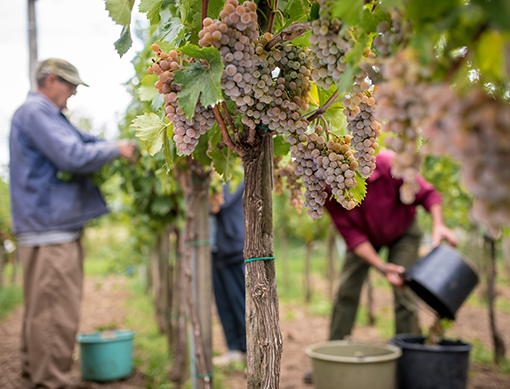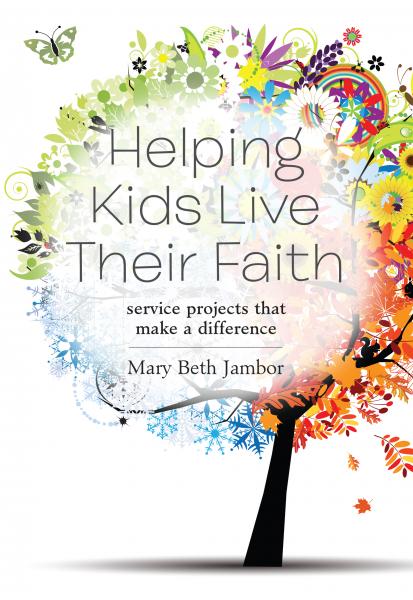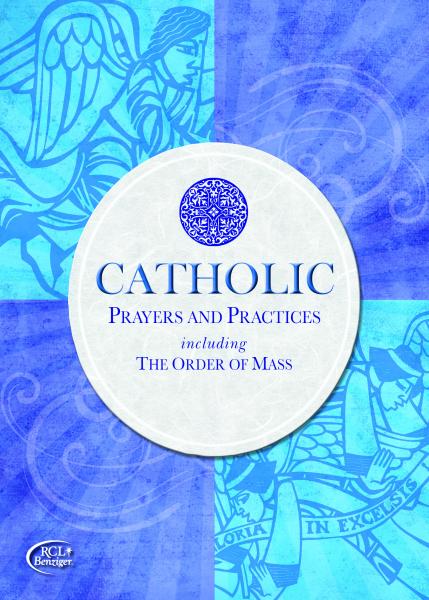What will you do this week to show God that you understand the relationship between faith and works?
Question of the Week - 28th Sunday in Ordinary Time, Year A
Isn't it nice to be invited to a celebration—whether dinner with close friends, graduation, a wedding, or an anniversary? In this roller coaster of a year, I daresay that most of us probably have not received many invitations to informal gatherings or more formal events. I know I have missed the opportunities to decorate our home and prepare special holiday meals for family and friends. My party clothes are in the closet, but—in the words of a local newscaster—"There's just no place to go!"
 How ironic that in today's Gospel (Matthew 22:1-14), the king offers a place to go, a party to attend, a feast to enjoy, and yet no one takes him up on the invitation. Some refuse to go, some ignore the invitation and go about other tasks, and others mistreat the servants who extend the invitation in the first place. In the end, the king's servants gather anyone they can find "good and bad," the Gospel tells us.
How ironic that in today's Gospel (Matthew 22:1-14), the king offers a place to go, a party to attend, a feast to enjoy, and yet no one takes him up on the invitation. Some refuse to go, some ignore the invitation and go about other tasks, and others mistreat the servants who extend the invitation in the first place. In the end, the king's servants gather anyone they can find "good and bad," the Gospel tells us.
The truth is, from March to today, God has faithfully extended the invitation:
- the invitation to offer our anxieties and worries to him in prayer
- the invitation to feast daily on his Word
- the invitation to reorient the way we spend the gift of time and whom we spend it with
- the invitation to take delight in blessing and serving others
Even amid a pandemic, good works continue, and they are inspired and enlightened by faith.
This week, begin each day by asking God, "What are you inviting me to say and do today? Who are you inviting me to serve?" Then, dare to answer the invitation, and be a blessing to the world!
Mary Sellars Malloy has over forty years' experience as a Catholic educator and lay minister. She is a frequent workshop presenter on prayer, liturgy, spirituality, the Sacraments, and the RCIA. Also, Mary leads retreats and parish missions throughout the country. Her goal is to encourage Catholics of all ages to appreciate and to live their Catholic faith.
In today’s stressful climate, it is not unexpected for those in service to the public to sometimes be short-tempered. Having been a waitress for many years, a job I thoroughly enjoyed, I am very familiar with the rude and challenging customers who are inevitably a part of most days, and whose behavior often affected my own.
My daughter-in-law, who worked as a chain pharmacy manager, told me dozens of stories of being abused by customers, yelled out, spit at, and even threatened. She was having trouble staying polite and in good spirits. I was happy when she finally resigned. No one should have to take that kind of abuse.
 Then I remember the time, years ago, when a customer behind me in line as I was checking out, asked the cashier how she was doing. “I am great,” she said with a broad grin. “It does not serve any purpose being miserable, does it?”
Then I remember the time, years ago, when a customer behind me in line as I was checking out, asked the cashier how she was doing. “I am great,” she said with a broad grin. “It does not serve any purpose being miserable, does it?”
I have remembered that moment because my father had little patience for miserable people. He was not referring to those who had good reason to be unhappy, or sad, or frustrated, but those people who were simply nasty, irritable, and just plain unpleasant, and who sucked the joy out of other people’s lives.
I think his feelings stemmed from living through the depression when he had to give up school in eighth grade to support his mom. His father was killed when he was eight. If anyone had a reason to be miserable, it was him, but I never heard him complain. However, I did hear him whistle a lot.
I know my father would have liked the cashier. He appreciated people who could still find a reason to smile in the middle of life’s difficulties. A smile is a contagious joy; he used to tell me, which is why he was drawn to my mom.
In these challenging times, joy may often seem to be out of reach. We are overwhelmed with doubt and fear for our future; many are struggling financially; many are lonely and unable to connect with friends and loved ones. Many are ill or hungry.
We expect that those who are hurting will not be smiling or feeling joy in times like these. However, we can be the smile they are missing, the joy, even if momentary, absent from their hearts.
Smile at someone, be present to someone, and remember the words of St. Teresa of Avila: “Christ has no body on earth now, but yours, no hands but yours, no feet but yours; yours are the eyes through which he looks with compassion on the world; yours are the feet with which he walks to do good; yours are the hands with which he blesses all the world.”
Mary Regina Morrell is a Catholic journalist, author, and syndicated columnist who has served the dioceses of Metuchen and Trenton, New Jersey, and RENEW International in the areas of catechesis and communication.
Question of the Week - 27th Sunday in Ordinary Time, Year A
Throughout the pandemic weeks and months, a close friend and I committed to read together a spiritual book and to send each other our daily reflections on the readings. We chose Macrina Wiederkehr’s The Flowing Grace of Now (Sorin Books, © 2019). Each week we are given a Scripture to ponder and suggestions for focusing our prayer and reflection.
As I considered this week’s question, I returned to Week Nine of the book, in which my friend and I reflected on Luke 13:10-17 (Cure of a Crippled Woman on the Sabbath). Invited to think about the things that bend and break us, Wiederkehr suggests; resentments that crowd out forgiveness, fear that stifles love, indifference that stifles passion, suspicion that dampens trust, selfishness that inhibits generosity, jealousy that dims hospitality, greed that stifles gratitude, and anxiety that shrouds joy. It strikes me that each phrase highlights something that impedes and something that is a sign of cooperation in bringing about the kingdom.
Today’s Gospel (Matthew 21:33-43) is full of behaviors that impede the coming of the kingdom. The lack of loyalty, theft, greed, hatred, and even murder impede the bountiful harvest the landowner desired. He had chosen tenants he should not have trusted. There are simply no signs of cooperation! However, today’s Second Reading (Philippians 4:6-9), one of my favorite New Testament passages, provides some foundations of cooperation as it invites us to pray, give thanks, and to seek what is true, honorable, just, pure, lovely, gracious, excellent, and worthy of praise.
Where do we find ourselves on the spectrum of impeding and cooperating with God, and with the building of God’s kingdom? This week, draw upon the wisdom of Macrina Wiederkehr and Saint Paul. Pray for the strength and grace to cooperate with God, who is always seeking trustworthy tenants for the vineyard he has planted.
Mary Sellars Malloy has over forty years’ experience as a Catholic educator and lay minister. She is a frequent workshop presenter on prayer, liturgy, spirituality, the Sacraments, and the RCIA. Also, Mary leads retreats and parish missions throughout the country. Her goal is to encourage Catholics of all ages to appreciate and to live their Catholic faith.
Some of my greatest pleasures as a writer and editor are the notes I received from readers over the years. Some continue to stay in contact, and I have come to consider them as friends. I have kept almost all the notes I have received during the past 25 years, and, occasionally, while cleaning out my files, I take them out and re-read them.
They often give me the boost of encouragement I need when my spirit is lagging. I am grateful for them and the people who took the time to write them.
I am certainly giving away my age by admitting I lived during the time of Emily Post manners, which meant such things as white gloves when you went shopping, Sunday best clothes for Mass, and cultivating the now lost art of the thank you note.
I learned that manners, and especially expressions of gratitude, are more than just trite social mores. They are opportunities to express respect and appreciation of others, build and nurture relationships, and develop that most crucial virtue—gratitude.
I believe the power of the handwritten note of any kind lies in both the words, a creative power themselves, and the time spent to write it and deliver it. You never know what good those two creative forces, time and words, will bring in to the lives of others.
When I was cleaning out my childhood home after the death of my parents, I discovered among their most treasured possessions letters sent between them during my father’s military service, poems and notes I had written to them as a child, cards with notes inside from friends and acquaintances, and even from high school students in the school where my mom worked as a secretary.
Many of those notes were expressions of gratitude for things my parents would never have considered as exceptional. What was exceptional for them were the thank you notes.
To be honest, I have fallen short in this area over the years. I could give dozens of excuses why, but they would be just that, excuses. Indeed, the world is different. We communicate so much digitally we often forget about the legacy of paper and pen—a sad thing for me as a writer to be admitting.
Still, I want to truly embrace what I have always believed—not everything old fashioned is outdated or without value. So I have posted a reminder at my computer, where I have also stashed some lovely, inexpensive blank note cards and a sheet of stamps.
The reminder is a Scripture quote from Ephesians, under the heading Children of Light: “Sing and make music in your hearts to the Lord, always giving thanks to God the Father for everything in the name of our Lord Jesus Christ” (5:19,20).
Mary Regina Morrell is a Catholic journalist, author, and syndicated columnist who has served the dioceses of Metuchen and Trenton, New Jersey, and RENEW International in the areas of catechesis and communication.
Recently, a very dear friend mentioned that all three of her daughters, married with children, were selling their houses simultaneously. The first of the houses had sold within a week of being on the market.
I was happy for them but recalled the very long and painful experience of trying to sell our house at the New Jersey shore several years after Super Storm Sandy destroyed our neighborhood.
It took my husband almost two years to restore the house after being flooded with four feet of water, but the insurance was inadequate to complete the repairs, so we were forced to sell the house we had planned to retire to, and which had given us many wonderful family memories.
Friends suggested I bury a statue of Saint Joseph in the yard, but the tradition seemed to be more superstition than faith, and why upside down? Why not prayers to the saint suffice? However, after almost nine months on the market with no offers and the bank breathing down our neck with foreclosure, I gave in to pressure and thought, “What do I have to lose?”
I had a statue of Saint Joseph, or so I thought, handed down to me after my mom died. I took it from the shelf and asked my husband to bury it in the front lawn, upside-down facing the house. As the instructions came out of my mouth, I could not believe what I was hearing. I rationalized it by telling myself it was my alter ego, a desperate woman grasping at straws.
One morning, after the deed was done, I realized it was not Saint Joseph I buried but Saint Anthony. How embarrassing!
Determined to make the best of it, I apologized to Saint Anthony and asked him to do what he does best, find things and people, like a buyer for our house. I suggested he collaborate with Saint Joseph, the patron saint of households, who had already heard from me many times.
So, maybe I should not have been surprised that within three weeks following the “burial,” we had three showings and a potential buyer. It took a few months longer actually to close a deal and beat the bank’s foreclosure process.
I prepared places of honor in my den for the two saints who have seemingly forgiven my silliness. I believe they were very much aware of my real need, not just to sell the house, but to be able to detach myself emotionally from a place that held a great deal of meaning and memories.
Undoubtedly, the saints are as numerous as the stars in the heavens, each shining their unique light on the world. These two saints, Joseph and Anthony, were standing by when I sought direction from God, prayed and cried, and asked for wisdom to make the right decisions.
They heard my words, “…through the intercession of the saints,” and they stepped in, not as real estate agents, but as companions... companions who are always consolers, always leading us to God and, sometimes, responsible for miracles.
Mary Regina Morrell is a Catholic journalist, author, and syndicated columnist who has served the dioceses of Metuchen and Trenton, New Jersey, and RENEW International in the areas of catechesis and communication.To say this has been an unusual year would be an understatement. It has been a year of significant challenges, struggles, and disappointments. Many of us are obligated to get to know our families better by spending every waking moment in their company. It has also been a time of prayer, or at least interior cries of "God, help me!"
Prayer does not come easy to many people. One of the most common comments I hear from readers is their insecurity when it comes to prayer. Many feel that they just do not know how to pray.
I share with them the thought of Saint Teresa of Avila, a doctor of the Church: "Prayer is being on terms of friendship with God, frequently conversing in secret with him who, we know, loves us."
When someone loves us, they expectantly wait for us to reach out to them with trust and love, with whatever words we have. Why would God, who is perfect love, expect any less? The Church's mothers and fathers have repeatedly taught that God desires an intimate relationship with us, not a routine one.
Pope Francis once posed a question to be considered by every Christian: "Do you think of God as someone who loves you?"
Our perception of God, he explained, has a great deal to do with our prayer life.
I often share the story of an old Irish woman living alone in a cottage tucked away in the mountainous crags along Ireland's coast. I like the story so much because it reflects the varying emotions I have from day to day, and the comfort I have in letting God know exactly how I feel.
One day, a visitor made his way to the old woman's cottage and, upon entering, announced he had come to see her because she was alone and in need of company.
"Alone, is it?!" she laughed with delight, "With Himself and his Blessed Mother keeping me company?" She waved a gnarled hand at the pictures that hung over the hearth – the Sacred Hearts of Jesus and Mary.
Later, that same visitor would return to the cottage and find one of the beloved pictures missing from its place of honor. The old woman furrowed her brow, saying, "We are having a tiff, he and I!"
Then she pointed to the drawer where she had stashed her dearest friend, face down no less.
Nevertheless, tiffs come to an end, and this wise, delightful woman, who loved and trusted God with the heart of a child, could most often be heard praying, in joy, anger, and grief, "Sweet Jesus!"
Saint Paul reminds us of the need to "pray without ceasing," which may seem like a dauntless task unless we take a different perspective.
Saint Augustine talks about the disposition of the heart and soul, as compared to the activity of saying prayers, explaining, "If your desire is continual, your prayer is continual."
Still, many people prefer speaking the words of a prayer. I have a collection of prayer books from both the Catholic and Jewish faiths and use them often. Having them handy in times of distress brings me great comfort, allowing me to speak the words I need to say when my brain is too overwhelmed to think of anything else.
We are all uniquely made by God. I am confident that God understands our individual prayer lives and is aware of our deep desire to pray, even if we are not confident in our words.
One of my favorite things about virtual Masses has been hearing the different hymn selections at various parishes, especially those parishes in other countries.
When I tuned into this past Sunday's Mass, a lovely voice sang the opening hymn words, "All are welcome in this place."
I hadn't heard this hymn since my days in catechetical service when it was sung at many religious educators' conferences.
For a moment, I recalled with a smile one night many years earlier when my husband and I and our six sons were sitting in our living room watching TV, some of us on the couch, some on chairs, and some on the floor.
Suddenly the front door opened, and two young women, obviously dressed for an evening out, stepped into the living room. I had no idea who they were, but none of us moved from our spots. They smiled at me. I smiled back and asked, "Can I help you?"
The young women realized they were in the wrong place and apologized, explaining they were supposed to be at the Elks Lodge somewhere in the neighborhood. "You have that big 'Welcome' sign hanging on the front porch, so we thought it was all right to come in," they said.
I assured them it was fine, we all laughed, and my husband walked them back to their waiting taxi and gave them directions to the Elks Lodge.
I've always wondered if that welcome sign has anything to do with the many unexpected visitors who knock on our door—asking for help of some kind, directions, gas, money, a phone call, or just a safe place to sit for a few minutes.
Perhaps my own experience has made the hymn words more meaningful to me, as in the first verse:
Let us build a house where love can dwell
and all can safely live,
a place where saints and children tell
how hearts learn to forgive.
Built of hopes and dreams and visions,
rock of faith and vault of grace;
here the love of Christ shall end divisions.
All are welcome, all are welcome,
all are welcome in this place.
(“All Are Welcome” words and music by Marty Haugen. Copyright © 1994 by GIA Publications, Inc. All rights reserved.)
The composer seems to be writing about our Catholic faith's radical hospitality, lived both in our personal lives and the sacred rites of our religion, particularly the Mass, where we encounter Jesus in response to his invitation to "Come, follow me."
With Jesus, explained the same Sunday Mass's homilist, "there was no such thing as an outsider." He reminded us that Jesus was disparagingly referred to as the friend of tax collectors and sinners, and it was for these that he came, hoping to build the vital relationship that leads to faith.Pope Francis has long stressed the importance of recognizing each other as brothers and sisters, as a pathway to peace and solidarity across the world. So it is no surprise that on Oct. 3, the Holy Father will sign a n
ew encyclical on human fraternity entitled "Fratelli Tutti," which may be translated in English as "Brothers and sisters, all."
Our journeys may begin with the radical hospitality of our faith—offered or received.
Mary Regina Morrell is a Catholic journalist, author, and syndicated columnist who has served the dioceses of Metuchen and Trenton, New Jersey, and RENEW International in the areas of catechesis and communication.PRODUCT SUGGESTION
Helping Kids Live Their Faith
 This book offers numerous ideas and opportunities to help children understand the importance of carrying out the Church's mission of serving their families, the community, and parish.
This book offers numerous ideas and opportunities to help children understand the importance of carrying out the Church's mission of serving their families, the community, and parish.
The Helping Kids Live Their Faith book exemplifies how children can live their faith based on the principles of Catholic Social Teaching. Blest Are We Faith in Action promotes faith, Word, and action, thereby this small book provides practical application through service projects to model ways to live and act in faith.
- It provides service project ideas that make a difference in the faith life of the student helping them learn to put their faith into action.
- The book provides principals, DRE's, teachers, catechists, ideas for service projects so that they may provide opportunities for children to both learn about and live their faith.
- It encourages the adult to serve as a model of faith helping the children understand what it looks like to live a life of faith.
- The Faith in Action feature in the Blest Are We series, is based on the principles of Catholic Social Teaching focused on the parish community; the book, Helping Kids Live Their Faith provides further information and practical application of Faith in Action with the broader community.
Question of the Week, 21st Sunday in Ordinary Time, Year A
Matthew 16:13-20
A few times in the past year, I’ve written about the life and ministry of Bishop Ken Untener. Bishop Ken came into my life after a difficult ministry experience that left me doubting my gifts and my usefulness as a Church minister. He hired me to serve as the director of the Worship Office in Saginaw, Michigan, and his first words to me were, “I am here to help you succeed.”
 I learned much from working with Bishop Ken, and I would summarize the lessons I strive to carry into my own life and ministry in the following way.
I learned much from working with Bishop Ken, and I would summarize the lessons I strive to carry into my own life and ministry in the following way.
- Be pastoral. Know what the Church teaches. Let that teaching inform your ministry, but meet the people you serve where they are, and call them forward from that place.
- Be prayerful. Don’t let the demands of ministry and life crowd out time for personal prayer and reflection on God’s Word. These are the foundations of the good work God has called you to do.
- Be playful. Maintain a spirit of joy, and take time to do the things you love to do and be with the people who uplift and inspire you.
- Be real. In the words of Saint Francis de Sales, “Be who YOU are, and be that perfectly well!”
- Be mindful. Always consider the needs of others, especially the poor.
- Be forgiving. That includes forgiving yourself. Nobody’s perfect!
- Be a visionary. Dream. Hope. Imagine. Believe. Inspire.
May we honor those who have inspired us by carrying their messages and examples into our work and into our daily living.
Mary Sellars Malloy has over forty years’ experience as a Catholic educator and lay minister. She is a frequent workshop presenter on the topics of prayer, liturgy, spirituality, the Sacraments, and the RCIA. In addition, Mary leads retreats and parish missions throughout the country. Her goal is to encourage Catholics of all ages to appreciate and to live their Catholic faith.
Product Recommendation
The Faithful Revolution, Vatican II
 Make Vatican II more than just a chapter in church history! The Faithful Revolution is a must-see for parish leadership, adult faith formation, or high school and college students.
Make Vatican II more than just a chapter in church history! The Faithful Revolution is a must-see for parish leadership, adult faith formation, or high school and college students.
This widely praised series is a must-see for parish leadership, adult faith formation groups, and high school and college students. Historic film footage coupled with insightful commentary makes The Faithful Revolution an invaluable educational resource.
More than 96 Council participants and attendees, cardinals and bishops, theologians, clerics, philosophers, and laypersons were filmed for the making of The Faithful Revolution. Production executives and crew traveled to eight countries on three continents.
When my oldest granddaughter was just three years old, she accompanied my daughter-in-law to a family wake. My daughter-in-law had instructed my granddaughter to say, “I’m sorry for your loss,” when greeting the family of the deceased in the funeral parlor.
As they stopped to speak with mourners, my granddaughter extended her little hand to each person and said with all seriousness, “I’m sorry you are lost.”
Often, out of the mouths of children comes wisdom.
What better way is there to describe that expansive feeling of grief, of losing someone whose presence has often been a compass, an anchor, an encouragement to fly and a promise of a forever home? We feel lost and adrift in our pain.
For some of us the experience seems to last forever and we wonder if we will ever feel whole again as we did when we knew who we were and where we belonged.
As human beings, we have a need to grieve such a deep loss. It is the process of grieving that allows us to heal, and often to learn that our emptiness and sense of being lost will only be overcome when we find our home in God.
Pope Francis reminds us, "Our loved ones have not disappeared into dark nothingness: Hope assures us that that they are in God's good and strong hands. Love is stronger than death."
Our sense of insolation can be tempered when we embrace our Catholic belief that we, also, are in God’s hands as we move through our grief.
The funeral rituals of our Catholic faith are important steps in our grieving, especially the Mass of Christian Burial. At the start of the Mass, the casket holding our loved one is draped with a white pall, recalling the white garment of Baptism when our Christian life begins, and reminds those gathered of their faith in the Resurrection.
During the Mass we are reminded of the union of the living and dead in the great Communion of Saints. With our faith family, we remember the life of our loved one and our belief that, though they are separated from us who are living, they are still at one with the community of believers. We also trust that they benefit from our prayers and intercession, as do we when we turn to prayer for strength.
Saint Augustine of Hippo discovered the truth that God is our true home, and Augustine shares that with us in his reflection, “Thou hast formed us for thyself, and our hearts are restless till they find rest in thee.”
Sometimes when we are lost it takes a long time to find our way again. Other times the journey is not so long. It is the same with grieving – different for everyone. But on every journey our Catholic faith is a blessed support.
The Catholic Order of Christian Funerals includes a comforting prayer for mourners:
Lord, God,
You are attentive to the voice of our pleading.
Let us find in your Son comfort in our sadness,
Certainty in our doubt, and courage to live through this hour.
Make our faith strong through Christ our Lord.
Amen.
Mary Regina Morrell is a Catholic journalist, author, and syndicated columnist who has served the dioceses of Metuchen and Trenton, New Jersey, and RENEW International in the areas of catechesis and communication.
Question of the Week, Twentieth Sunday in Ordinary Time, Year A
Matthew 15:21-28
Several years ago, I served as music minister of a merged parish whose members were African-American, Hispanic, Italian, and Polish. Each culture brought to the table a variety of feasts, celebrations, traditions, and—of course—music, that invited growth in awareness and understanding.
A t that parish, I first explored the wealth of bilingual psalmody and music that engaged voices and hearts. I learned to sing “Silent Night” in Polish and Italian. And there we sang the spiritual “I’ll Be Singing Up There” as the Song of Farewell for a beloved mother-figure to many and “Good News, the Chariot’s a’Comin” at the funeral Mass for Beulah, a long-time choir member who, at the end of her life, had no recognition of who I was, but could still join me in singing her alto part to “Amazing Grace.”
t that parish, I first explored the wealth of bilingual psalmody and music that engaged voices and hearts. I learned to sing “Silent Night” in Polish and Italian. And there we sang the spiritual “I’ll Be Singing Up There” as the Song of Farewell for a beloved mother-figure to many and “Good News, the Chariot’s a’Comin” at the funeral Mass for Beulah, a long-time choir member who, at the end of her life, had no recognition of who I was, but could still join me in singing her alto part to “Amazing Grace.”
And faith was shared at table, as Erlinda invited Michael and me to a Guadalupe feast of tamales, and Romie and Jesse introduced us to the rich and flavorful mole. Faith was shared at the table of Bobbie, who could cook fried chicken and greens to perfection, and at the family sausage-making gathering hosted by Andy and Floyd. All of these families worked together to make any parish dinner a tasty celebration of culture and community.
As I think about our friends today, and all that Michael and I learned from them, the sixth verse of “Where Charity and Love Prevail” comes to mind: No race nor creed can love exclude if honored be God’s name; Our family embraces all whose Father is the same.
May we continue the work of peace and justice, welcoming all to our tables, until these words are true in our lives and in our world.
Mary Sellars Malloy has over forty years’ experience as a Catholic educator and lay minister. She is a frequent workshop presenter on the topics of prayer, liturgy, spirituality, the Sacraments, and the RCIA. In addition, Mary leads retreats and parish missions throughout the country. Her goal is to encourage Catholics of all ages to appreciate and to live their Catholic faith.
Product Recommendation
Catholic Prayers and Practices
This small book, Catholic Prayers and Practices including The Order of Mass, contains traditional practices and prayers that unite us as Catholics. It is designed to support you in your faith life, and it can assist you in helping the younger members of our Church learn, grow and live as active members of the Catholic community.
This resource can be used for private, family or communal prayer. The Order of Mass section incorporates the language of the revised Roman Missal. Share the faith by giving copies of this book to others. In this way you are sharing in the ministry of our Lord, Jesus Christ, who called us to be his disciples and to share the Good News with all people.
Pagination
Latest
Categories
Archives
- February 2015 (2)
- March 2015 (2)
- April 2015 (5)
- May 2015 (3)
- June 2015 (6)
- July 2015 (3)
- August 2015 (5)
- September 2015 (5)
- October 2015 (4)
- November 2015 (2)
- December 2015 (1)
- February 2016 (2)
- March 2016 (1)
- April 2016 (2)
- May 2016 (2)
- July 2016 (2)
- August 2016 (2)
- September 2016 (1)
- October 2016 (5)
- November 2016 (1)
- December 2016 (3)
- January 2017 (2)
- February 2017 (3)
- March 2017 (2)
- April 2017 (1)
- June 2017 (2)
- July 2017 (2)
- August 2017 (1)
- April 2018 (1)
- October 2018 (2)
- December 2018 (2)
- February 2019 (3)
- March 2019 (2)
- April 2019 (2)
- May 2019 (3)
- June 2019 (1)
- July 2019 (16)
- August 2019 (8)
- March 2020 (4)
- April 2020 (6)
- May 2020 (8)
- June 2020 (7)
- July 2020 (5)
- August 2020 (7)
- September 2020 (4)
- October 2020 (5)
- November 2020 (9)
- December 2020 (11)
- January 2021 (10)
- February 2021 (8)
- March 2021 (5)
- April 2021 (4)
- May 2021 (4)
- June 2021 (5)
- July 2021 (2)
- August 2021 (3)
- September 2021 (4)
- October 2021 (4)
- November 2021 (2)
- December 2021 (5)
- January 2022 (4)
- February 2022 (4)
- March 2022 (9)
- April 2022 (7)
- May 2022 (9)
- June 2022 (12)
- July 2022 (7)
- August 2022 (10)
- September 2022 (9)
- October 2022 (11)
- November 2022 (8)
- December 2022 (7)
- January 2023 (2)
- February 2023 (10)
- March 2023 (9)
- April 2023 (10)
- May 2023 (8)
- June 2023 (4)
- July 2023 (3)
- August 2023 (2)
